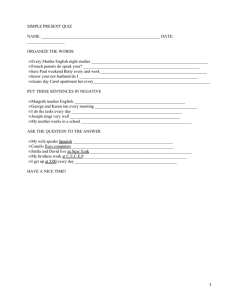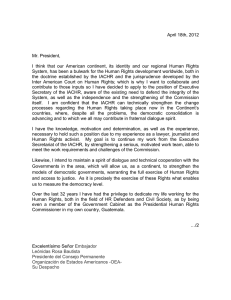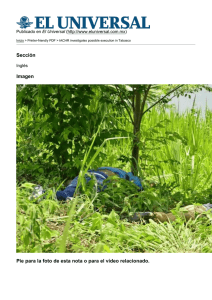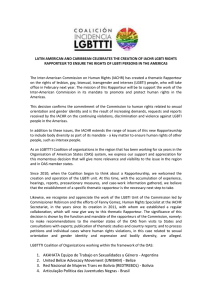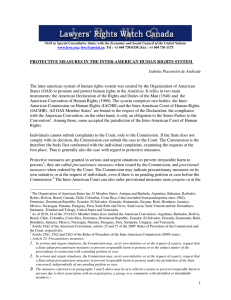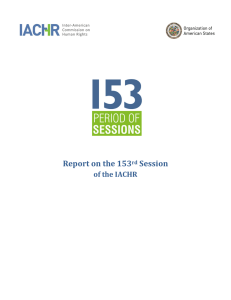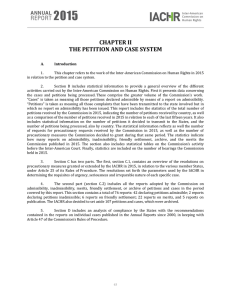INTER-AMERICAN COMMISSION ON HUMAN RIGHTS
Anuncio
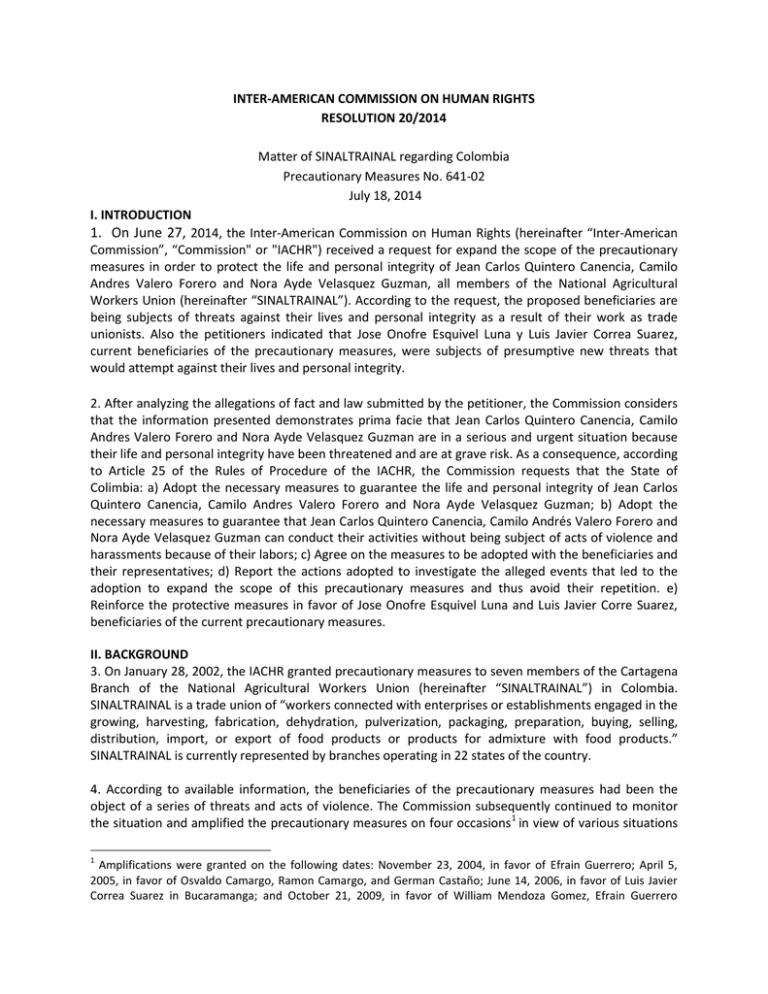
INTER-AMERICAN COMMISSION ON HUMAN RIGHTS RESOLUTION 20/2014 Matter of SINALTRAINAL regarding Colombia Precautionary Measures No. 641-02 July 18, 2014 I. INTRODUCTION 1. On June 27, 2014, the Inter-American Commission on Human Rights (hereinafter “Inter-American Commission”, “Commission" or "IACHR") received a request for expand the scope of the precautionary measures in order to protect the life and personal integrity of Jean Carlos Quintero Canencia, Camilo Andres Valero Forero and Nora Ayde Velasquez Guzman, all members of the National Agricultural Workers Union (hereinafter “SINALTRAINAL”). According to the request, the proposed beneficiaries are being subjects of threats against their lives and personal integrity as a result of their work as trade unionists. Also the petitioners indicated that Jose Onofre Esquivel Luna y Luis Javier Correa Suarez, current beneficiaries of the precautionary measures, were subjects of presumptive new threats that would attempt against their lives and personal integrity. 2. After analyzing the allegations of fact and law submitted by the petitioner, the Commission considers that the information presented demonstrates prima facie that Jean Carlos Quintero Canencia, Camilo Andres Valero Forero and Nora Ayde Velasquez Guzman are in a serious and urgent situation because their life and personal integrity have been threatened and are at grave risk. As a consequence, according to Article 25 of the Rules of Procedure of the IACHR, the Commission requests that the State of Colimbia: a) Adopt the necessary measures to guarantee the life and personal integrity of Jean Carlos Quintero Canencia, Camilo Andres Valero Forero and Nora Ayde Velasquez Guzman; b) Adopt the necessary measures to guarantee that Jean Carlos Quintero Canencia, Camilo Andrés Valero Forero and Nora Ayde Velasquez Guzman can conduct their activities without being subject of acts of violence and harassments because of their labors; c) Agree on the measures to be adopted with the beneficiaries and their representatives; d) Report the actions adopted to investigate the alleged events that led to the adoption to expand the scope of this precautionary measures and thus avoid their repetition. e) Reinforce the protective measures in favor of Jose Onofre Esquivel Luna and Luis Javier Corre Suarez, beneficiaries of the current precautionary measures. II. BACKGROUND 3. On January 28, 2002, the IACHR granted precautionary measures to seven members of the Cartagena Branch of the National Agricultural Workers Union (hereinafter “SINALTRAINAL”) in Colombia. SINALTRAINAL is a trade union of “workers connected with enterprises or establishments engaged in the growing, harvesting, fabrication, dehydration, pulverization, packaging, preparation, buying, selling, distribution, import, or export of food products or products for admixture with food products.” SINALTRAINAL is currently represented by branches operating in 22 states of the country. 4. According to available information, the beneficiaries of the precautionary measures had been the object of a series of threats and acts of violence. The Commission subsequently continued to monitor the situation and amplified the precautionary measures on four occasions 1 in view of various situations 1 Amplifications were granted on the following dates: November 23, 2004, in favor of Efrain Guerrero; April 5, 2005, in favor of Osvaldo Camargo, Ramon Camargo, and German Castaño; June 14, 2006, in favor of Luis Javier Correa Suarez in Bucaramanga; and October 21, 2009, in favor of William Mendoza Gomez, Efrain Guerrero of perceived risk faced by these individuals as a result of their work as trade unionists. Since the precautionary measures went into effect 12 years ago, the Commission has continued to follow up and receive information on the specific situation of members of this union. It has given special attention to the situation through written proceedings and working meetings. At the most recent working meetings, held during the 133rd, 144th and 150th sessions of the IACHR, information was received from both parties. The petitioners reported a climate of threats and harassment of the beneficiaries in the context of the situation of trade union members in Colombia. 5. Over the course of the proceedings, the State has supplied information on a series of protective measures, including (i) that it has provided “guides to self-protection” and telephone numbers for contacting the local police to precautionary measure beneficiaries (generally SINALTRAINAL members); (ii) that various SINALTRAINAL sub-offices have collective protection strategies (airplane tickets, strategies with ordinary vehicles, bulletproofing of some offices, Avantel communications media); (iii) relocation assistance, bulletproof vests, cellular communications media, and escorts; (iv) that it is implementing meetings to agree on the precautionary measures; (v) that it has carried out risk level studies, which indicate extraordinary risk for some individuals and ordinary risk for others; (vi) that it is investigating the complaints filed; (vii) during various working meetings on the precautionary measures, the State has expressed, inter alia, its commitment to protecting precautionary measure beneficiaries and, specifically, union members. II. SUMMARY OF FACTS AND ARGUMENTS PROVIDED BY THE PETITIONERS 6. Based on the request to expand the scope of the precautionary measures, the petitioners presented the following facts and arguments: a. Regarding Jean Carlos Quintero Canencia, a SINALTRAINAL member in the city of Valledupar, the petitioners indicate that, on April 1, 2014, he received a threatening cell phone call telling him to “leave things alone because they know where his daughter goes to school, and they also know where she lives, and they would kill her today.” The same afternoon, on arriving home and opening the door, Mr. Quintero found a note which read: “Watch out scum leave things alone or we will kill you.” These alleged facts were reported to the Office of the Prosecutor General on April 4, 2014. The petitioners indicate that, to date, they have not received any report on the status of the investigations. b. Regarding Camilo Andrés Valero Forero, a SINALTRAINAL member in the municipality of Facatativá, the petitioners indicate that, on the afternoon of April 3, 2014, the proposed beneficiary received a telephone call at home, presumably from an unknown person, who told him “to be careful, because they were going to cut him up and take a saw to him.” When the proposed beneficiary asked to whom the caller wished to speak, he answered, “Your f***ing mother, watch it you SOB, because we’re going to kill you.” These alleged facts were reported to the Office of the Prosecutor on April 7, 2014. c. Regarding Nora Ayde Velásquez Guzmán, a SINALTRAINAL member and officer in the city of Medellín, the petitioners indicate that, on the morning of June 4, 2014, she received a cell phone call insulting her and warning her that “they did not want to see her at union meetings Beltran, Luis Javier Correa, Jose Domingo Flores, Luis Eduardo García, Rafael Esquivel, Martin Agudelo, Onofre Esquivel, Alvaro Varela, Fabio Olaya, Julio Lopez, Pedro Taguado, and Diego Alfonso Rodriguez. and, if they did, they would throw acid in her face, and they warned her that they know where she works.” The petitioners report that, since deciding to join SINALTRAINAL, the proposed beneficiary has been the object of “systematic persecution, consisting of firing, prosecution to strip her of union membership, and constant harassment in the workplace.” In the petitioners’ words, “It should be noted that the practice of throwing acid in women’s faces has unfortunately become a commonplace practice in Colombia and, as in the case of the described threat, is now used as a warning to women involved in union activities.” The petitioners have provided copies of complaints filed with the Office of the Prosecutor General and the National Protection Unit (hereinafter “UNP”). 7. In addition, the petitioners report alleged threats against José Onofre Esquivel Luna and Luis Javier Corre Suárez, who are already beneficiaries of the protective measures. Specifically, the petitioners have reported the following: a. Regarding the beneficiary José Onofre Esquivel Luna, Vice Chairman of SINALTRAINAL, they indicate that, on the afternoon of June 16, 2014, while organizing in the city of Medellín in a utility vehicle provided as part of the UNP protection strategy assigned to him, he was allegedly approached by two individuals who pointed guns at him. The beneficiary’s escort reacted to the situation, and in the resulting exchange of gunfire, one of the assailants was killed and the other, wounded. The petitioners also allege that the beneficiary is the object of constant death threats. In the most recent (November 2013), he received the following text message: “F***ing guerrilla fighters - you keep messing with [a private company] and no more forgiveness - we will cut you up - death to all SINALTRAINAL communists - Urabeños. The petitioners state that the described facts were reported to the Office of the Prosecutor General on June 20, 2014. b. Regarding the beneficiary Luis Javier Correa Suárez, the petitioners indicate that on June 11, 2014, he received an email warning him of a planned attempt on his life and reportedly containing a link to a recording of a conversation about the alleged plan to kill him. III. ANALYSIS OF THE ELEMENTS OF GRAVITY, URGENCY AND IRREPARABILITY 8. The precautionary measures mechanism is part of the Commission’s oversight function of Member State compliance with the human rights obligations set forth in Article 106 of the Charter of the Organization of American States. These general oversight functions are set forth in Article 41 (b) of the American Convention on Human Rights, and Article 18 (b) of the Commission’s Statute. The precautionary measures mechanism is described in Article 25 of the Commission’s Rules of Procedure. According to this Article, the Commission issues precautionary measures in serious and urgent situations, and where such measures are necessary to prevent irreparable harm to persons. 9. The Inter-American Commission and the Inter-American Court of Human Rights (hereinafter “the Inter-American Court”) have repeatedly established that precautionary and provisional measures have a dual nature, precautionary and protective. Regarding the protective nature, the measures seek to avoid irreparable harm and preserve the exercise of human rights. Regarding the precautionary nature, the measures have the purpose of preserving a legal situation being considered by the IACHR. The precautionary nature aims at preserving those rights at risk until the petition in the Inter-American system is resolved. Its object and purpose are to ensure the integrity and effectiveness of the decision on the merits and, thus, avoid infringement of the rights at issue, which could adversely affect the useful purpose (effet utile) of the final decision. In this regard, precautionary measures or provisional measures enable the State concerned to comply with the final decision and, if necessary, to provide the reparations ordered. As such, for the purposes of making a decision, and in accordance with article 25.2 of its Rules of Procedure, the Commission considers that: a) a. “serious situation” refers to a grave impact that an action or omission can have on a protected right or on the eventual effect of a pending decision in a case or petition before the organs of the Inter-American System; b) b. “urgent situation” refers to a risk or threat that is imminent and can materialize, thus requiring immediate preventive or protective action; and c) c. “irreparable harm” refers to an injury to rights which, due to their nature, would not be susceptible to reparation, restoration, or adequate compensation. 10. The IACHR notes that the petitioner’s most recent written communication deals with (i) a request for amplification of the precautionary measures to include Jean Carlos Quintero Canencia, Camilo Andrés Valero Forero, and Nora Ayde Velásquez Guzmán and (ii) the perceived current situation of precautionary measure beneficiaries José Onofre Esquivel Luna and Luis Javier Corre Suárez. i. Request for amplification of the precautionary measures to include Jean Carlos Quintero Canencia, Camilo Andrés Valero Forero, and Nora Ayde Velásquez Guzmán 11. In the present case, in relation to the request for amplification, the Commission considers the requirement of seriousness to have been met in view of the alleged facts involving death threats and intimidation against Jean Carlos Quintero Canencia, Camilo Andrés Valero Forero, and Nora Ayde Velásquez Guzmán. Specifically, the information provided suggests that the perceived situation represents a form of retaliation and intimidation for their work in the trade union. It also suggests that the alleged perpetrators know where these individuals and their families live. In the circumstances, the alleged threat of throwing acid in the face of Nora Ayde Velásquez Guzmán takes on particular importance as a means of keeping her from attending the meetings of her union. 12. In analyzing this requirement, the Commission notes that the information provided by the petitioners is consistent with general information on the specific situation of trade unionists in Colombia obtained in the course of public hearings 2 and preparation of its Second Report on the Situation of Human Rights Defenders in the Americas. 3 Similarly, in her January 2012 report on the human rights situation in Colombia, the United Nations High Commissioner expressed concern about the significant number of attacks against human rights defenders and trade union members. 4 13. With respect to the requirement of urgency, the IACHR considers this requirement to have been met in view of the ongoing nature and proximity in time of the threats received by SINALTRAINAL members Jean Carlos Quintero Canencia, Camilo Andrés Valero Forero, and Nora Ayde Velásquez Guzmán in recent months. Specifically, the contextual circumstances and ongoing history of risk suggest a need for 2 See, inter alia, the following IACHR public hearings: “Labor Union Rights in Colombia,” 143rd session; “Situation of Human Rights Defenders in Colombia and Implementation of Precautionary Measures,” 140th session. 3 See IACHR, Second Report on the Situation of Human Rights Defenders in the Americas, December 31, 2011. 4 United Nations, Human Rights Council, Annual report of the United Nations High Commissioner for Human Rights, “Report of the United Nations High Commissioner for Human Rights on the situation of human rights in Colombia,” January 31, 2012, par. 14 and 15; United Nations, Human Rights Council, Report of the Special Rapporteur on the situation of human rights defenders, Margaret Sekaggya, “Mission to Colombia (7-18 September 2009),” March 4, 2010, par. 17. immediate protection to prevent possible harm to the rights of these individuals. In this context, it is appropriate to note that the petitioners report they have filed complaints, with no results to date. 14. The Commission considers the requirement of irreparability to have been met insofar as the possible violation of the right to life and personal integrity constitutes a situation of maximum irreparable harm. 15. Under Article 25.5 of its Rules of Procedure, the IACHR generally requests information from the State before deciding on a request for precautionary measures, except in cases such as the present one in which the possibility of immediate harm does not permit delay. Similarly, in the present case, it is important to point out that the decision under consideration involves a request for amplification related to a case that has been closely monitored by the IACHR. 16. Regarding the work of human rights defenders in the region, the IACHR has consistently pointed to the importance and ethical dimension of the work carried out by individuals and organizations dedicated to promoting, monitoring, and providing counsel in the area of human rights. For its part, the InterAmerican Court has written that “States have a specific duty to protect all people working in nongovernmental organizations and give effective and adequate guarantees to human rights defenders so that they may carry out their work freely, and to prevent acts that would limit or hamper that work, since it constitutes a positive contribution and supplements the efforts made by the State in its capacity as guarantor of the rights of individuals under its jurisdiction.” In the circumstances, the Commission considers that the acts of violence and other attacks against human right defenders not only violate the guarantees due to all human beings but also undermine their fundamental role in society and leave all those for whom they fight defenseless. ii. Perceived current situation of precautionary measure beneficiaries José Onofre Esquivel Luna and Luis Javier Corre Suárez 17. The IACHR notes the information provided by the petitioners regarding the alleged worsening of the risk situation of current precautionary measure beneficiaries José Onofre Esquivel Luna and Luis Javier Corre Suárez, who are reported to have recently experienced serious threats and situations potentially endangering their right to life and personal integrity. Specifically, they allege new threats by illegal groups, acts of violence, and murder plans in the context of their work as trade union members. The IACHR considers that the described situations require a prompt response from the State, as well as measures to strengthen the protective measures currently in place. IV. BENEFICIARIES 18. The request for precautionary measures has been filed on behalf of Jean Carlos Quintero Canencia, Camilo Andres Valero Forero y Nora Ayde Velasquez Guzman. V. DECISION 19. In view of the above-mentioned information, the Commission considers that this case prima facie meets the requirements of seriousness, urgency, and irreparability established in Article 25 of its Rules of Procedure. Consequently, the IACHR increases the number of beneficiaries of the MC 641-02, in this regard requests that the Government of Colombia: a) Adopt the necessary measures to guarantee the life and personal integrity of Jean Carlos Quintero Canencia, Camilo Andres Valero Forero and Nora Ayde Velasquez Guzman. b) Adopt the necessary measures to guarantee that Jean Carlos Quintero Canencia, Camilo Andrés Valero Forero and Nora Ayde Velasquez Guzman can conduct their activities without being subject of acts of violence and harassments because of their labors; c) Agree on the measures to be adopted with the beneficiaries and their representatives; d) Report the actions adopted to investigate the alleged events that led to the adoption to expand the scope of this precautionary measures and thus avoid their repetition; and e) Reinforce the protective measures in favor of Jose Onofre Esquivel Luna and Luis Javier Corre Suarez, beneficiaries of the current precautionary measures. 20. The Commission also requests the Government of Colombia to inform it, within 15 days after the date of the present resolution, on the adoption of required precautionary measures and to regularly update this information. 21. The Commission emphasizes that, according to Article 25 (8) of its Rules of Procedure, the granting of this precautionary measure and its adoption by the State shall not constitute a prejudgment on any possible violation of the rights protected in the American Convention on Human Right and other applicable instruments. 22. The Commission orders the Executive Secretariat of the Inter-American Commission on Human Rights to notify the Government of Colombia and the petitioner of this resolution. 23. Approved on the July 18, 2014 by: Tracy Robinson, President; Rose-Marie Belle Antoine First Vicepresident, Felipe González, Second Vice President; Commissioners Jose de Jesus Orozco Henriquez, Rosa Maria Ortiz, James Cavallaro and Paulo Vannuchi. Signed by Elizabeth Abi-Mershed Assistant Executive Secretary
